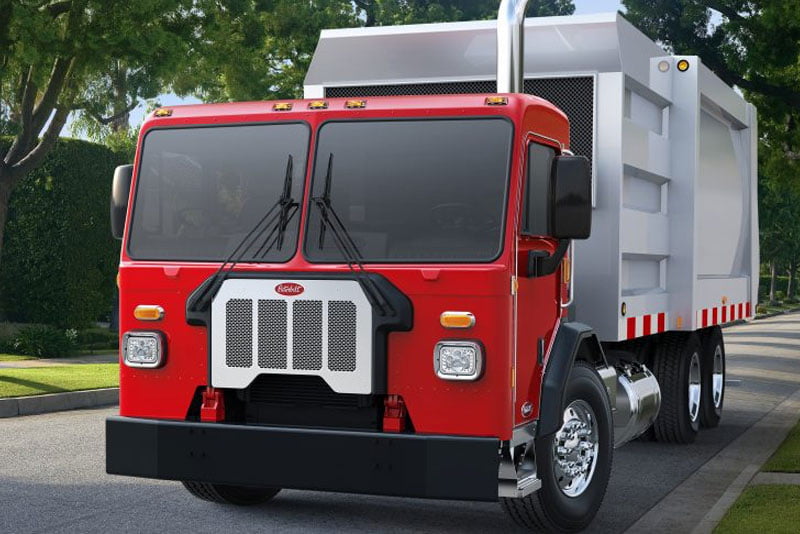Heavy-Duty Truck giant Peterbilt took the wraps off a battery-electric Class 8 garbage truck at the ongoing WasteExpo 2017 in New Orleans.
Peterbilt already offers a line of diesel Class 8 garbage trucks. It is exploring an electric-drive system in order to help customers meet often stringent state and local emissions regulations, said Scott Newhouse, Peterbilt’s chief engineer.
Electric drive systems also can significantly increase fuel efficiency, a priority for most fleet operators.
If it moves into production with the truck, Texas-based Peterbilt would be the first major U.S. truck maker to market an all-electric trash truck – but it would not be without competition in what has been estimated as a $10 billion-a-year global market.
Others already actively marketing electric refuse trucks include Motiv Power Systems, Wrightspeed Inc., and BYD. All three are based in California, Motiv and Wrightspeed in the Bay Area, BYD in the high desert northeast of Los Angeles.
Wrightspeed and Motiv are retrofitters, installing their electric drive systems in customers’ trucks; BYD builds its own trucks based on chassis shipped here from its parent in China.
Additionally, Mack Trucks, a unit of Sweden’s Volvo Group and a major Peterbilt competitor, displayed a prototype Mack electric garbage truck at the 2016 WasteExpo. The truck used a Wrightspeed powertrain.
Wrightspeed uses a diesel turbine range extender to generate power for a relatively small battery pack while the others use battery-dependent systems with very large battery packs.
North Carolina-based Mack doesn’t have the electric truck in its current product lineup and said it has no plans to actively market the truck until all testing is been completed.
The Peterbilt electric trash truck uses the company’s Model 520 chassis and an electric powertrain from Southern California-based TransPower. The 520 is a dedicated refuse truck chassis now marketed with diesel or compressed natural gas engines.
The truck uses a variant of TransPower’s ElecTruk system, with a 300-kiloWatt-hour rechargeable lithium-ion battery pack providing juice to a powerful electric motor. TransPower said a depleted battery pack can be recharged in just over four hours and is good for up to 65 miles – normal for a trash truck’s eight-hour day.
The ElecTruck system has logged more than 80,000 miles of commercial Class 8 use since its introduction in 2013, the company said.
Peterbilt stopped short of pledging to put its electric trash truck into production, but “is working closely with its partners to explore the capabilities and performance of battery-electric drive systems,” Newhouse said.
Ian Wright, founder and CEO of Wrightspeed, has said that there is a significant economic case for electric trash trucks.
While refuse trucks don’t travel all that far each day, they lug tremendous loads and are subject to stop-start cycles that are brutal on brake and engine systems. The typical Class 8 refuse truck also slurps down about 4,000 gallons of diesel fuel each year.
Electric systems, which use the electric motor rather than mechanical brakes for much of their stopping power, help reduce brake wear. They also don’t have complex transmissions or many moving parts in the motors, reducing costly maintenance and repair bills. Additionally, electricity is considerably cheaper than diesel fuel.
Wright estimates that an electric powertrain can save trash truck operators $35,000 a year in fuel and maintenance costs per vehicle.
As long as savings like that can be demonstrated, there is likely to be a healthy market, said Michael Held, powertrain analyst with global consulting firm AlixPartners.



